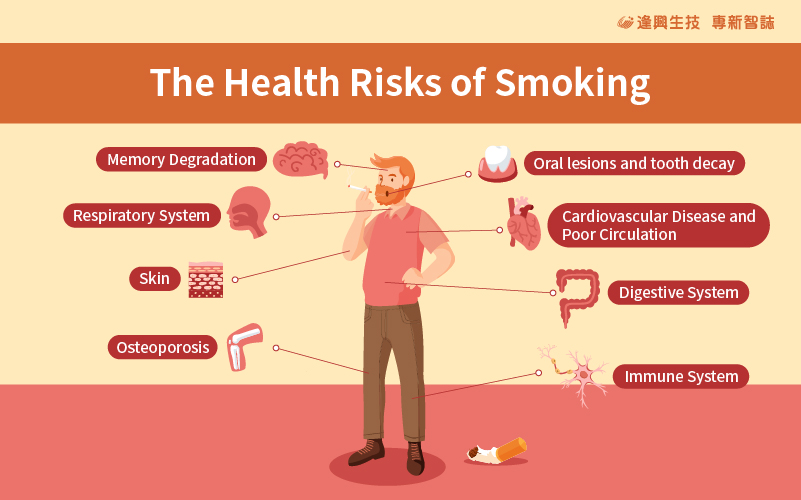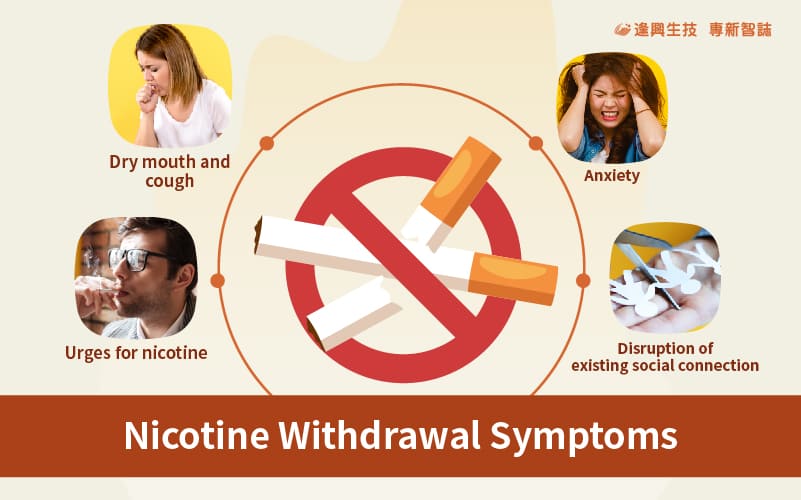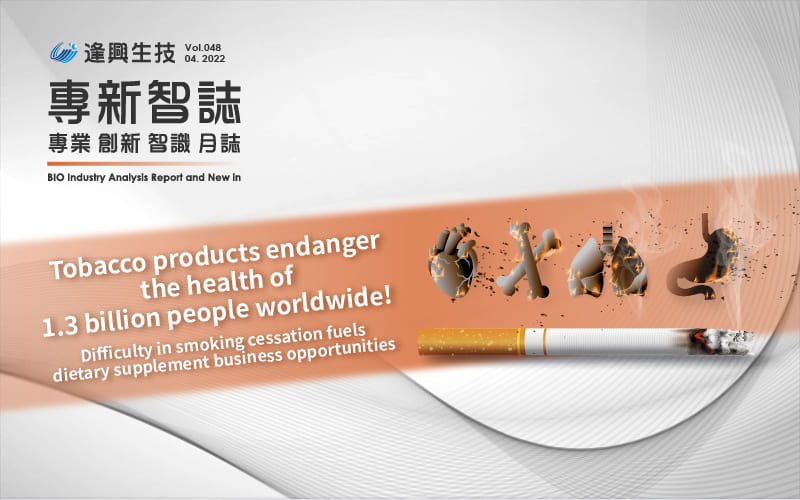Tobacco products are incredibly harmful, whether you take them actively or you’re exposed to passive smoking. They deplete the vitamins and minerals present in your body. But beyond that, the side effects of tobacco smoking haunt you even after you quit smoking. This is why passive smoking prevention isn’t taken as a minor issue.
The global trend, the dangers of smoking, and why it is so hard to quit!
Health awareness has increased over the years. And in recent years, the number of smokers has declined yearly due to restrictions on smoking areas under the Tobacco Hazards Prevention Act. Despite decreasing tobacco use, there are still about 1.3 billion smokers worldwide[1]. Tobacco products cause nutrient loss in smokers and affect their health, bringing about the need for supplements for smokers.
Studies have shown that smoking affects the body’s ability to absorb various vitamins and minerals. Smokers require 35 mg more vitamin C per day than non-smokers. Thus, there is a need for supplements to reverse smoking damage. Studies also show that the concentrations of vitamin B6 and B12 in smokers’ plasma are 1.5 and 1.2 times lower than those of the general public. As such, vitamins for smokers must be taken in higher quantities than for non-smokers to compensate for the tobacco damage. In addition, the concentration of red blood cells and the mucous membrane is much lower in smokers than in non-smokers. The nicotine in cigarettes causes damage to blood vessels and organs throughout the body, increasing the risk of heart disease, high blood sugar, osteoporosis, and cancer[2]. Tobacco products kill more than 8 million people each year[3], according to the WHO. Little wonder there is more enlightenment and awareness on vitamins for smokers, passive smoking prevention, and supplements to reverse smoking damage.
Many people decide to quit smoking due to health concerns, but withdrawal symptoms are often the most difficult hurdles to overcome. Nicotine enters the bloodstream from the lungs, causing a rise in blood pressure, an increase in heart rate, and the production of pleasurable dopamine. Nicotine concentration in the bloodstream decreases when a smoker has not smoked for a while. Consequently, adverse physical and psychological reactions occur, such as fatigue, dizziness, a craving for food, dry mouth, coughing, and sore throat. Many smokers who quit tobacco can hardly cope with nicotine withdrawal symptoms, and relapse is easy.

Even if you don’t smoke, you may still be affected by second or thirdhand smoke.
- Secondhand smoke is inhaling tobacco smoke for more than 15 minutes on more than one day per week.
- Thirdhand smoke describes the pollution left in the environment after the cigarette is put out.
Due to the strong surface adhesion of nicotine, it is easy to react with compounds in the air to produce more toxic carcinogens that stick to clothes, curtains, or carpets that the public can easily ignore[4]. Non-smokers assume they are not affected by smoking. Still, studies show individuals exposed to secondhand smoke are 30%[5] more likely to develop cardiovascular disease, lung cancer, and other conditions than those who are not. So, while supplements for smokers should be a non-negotiable, individuals who experience second or thirdhand smoke also need dietary supplementation. Tobacco products have adverse long-term effects on people’s health, so we must pay more attention to improving the well-being of smokers and those around them.
[1] Tobacco use continues to fall, but still ‘long way to go’
https://news.un.org/en/story/2021/11/1105882
[2] Nutrition for Cigarette Smokers
https://www.winchesterhospital.org/health-library/article?id=21549
[3] Annual number of deaths from select risk factors worldwide in 2019
https://www.statista.com/statistics/1169367/worldwide-number-deaths-risk-factor/
[4] Thirdhand smoke: Genotoxicity and carcinogenic potential
https://pubmed.ncbi.nlm.nih.gov/32226932/
[5] The Effects of Secondhand Smoke
https://www.webmd.com/smoking-cessation/effects-of-secondhand-smoke
Tobacco poses a severe threat to health; however, quitting also comes with withdrawal symptoms.
Quit smoking supplements help smokers and passive smokers by alleviating nicotine withdrawal symptoms and replenishing nutrition.
Many long-term smokers worry that stopping the habit may result in losing their source of relief and expression, so they cannot quit smoking successfully. Their body system also inevitably suffers discomfort, such as coughing, phlegm, poor breathing, and other adverse effects. According to statistics, only 3 to 5% of people can quit smoking for more than six months by willpower alone, so professional help or cessation aids such as nicotine patches are required to increase success.
Globally, the problem of secondhand or thirdhand smoke still needs to be addressed. However, the extended period spent at home after the pandemic has exacerbated the situation[6]. To enhance protection in daily life, actively keep your house clean and strengthen your body through dietary supplements. Those who want to quit smoking can also take this opportunity to enhance their resilience to withdrawal symptoms and quit smoking gradually.
In response to the needs of smokers who want to quit tobacco, some dietary supplements to reverse smoking damage in the capsule dosage form have been developed and are now available on the market. However, many users find it challenging to take capsules regularly due to the appearance of medicine. In addition, smokers cannot chew tablets to fill the void of quitting smoking.
To overcome the current obstacles, Wel-Bloom introduced friendly dosage forms of lozenges and gummies for those who want to quit smoking or suffer from second or thirdhand smoke. The lozenges and gummies contain vitamin C, vitamin B6, and vitamin B12, nutrients commonly deficient among smokers. In addition to providing nutrition, you can chew on them to resist a tobacco craving. Wel-Bloom is currently developing more food-like dosage forms, such as jellies and drinks, to benefit the nutrition supplementation of the entire family at all ages and protect individuals exposed to second and thirdhand smoke.
[6] Passive tobacco smoke in children and young people during the COVID-19 pandemic
https://www.thelancet.com/journals/lanres/article/PIIS2213-2600(21)00231-9/fulltext

